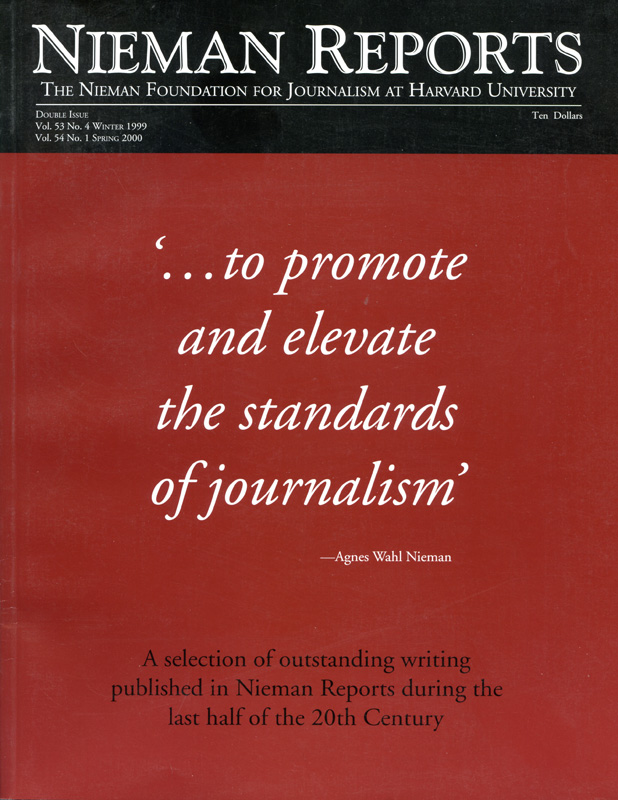Midway through the last century, the Hutchins Commission on Freedom of the Press issued its report, concluding that only a responsible press—responsible for meeting the needs of a democratic people and responsible for adhering to its core principles—could remain free.
Nieman Reports highlighted the Commission’s report in its inaugural year and now its findings open this first retrospective issue. This is fitting since the conclusions reached then seem remarkably relevant today. During the 1940’s, Commission members examined what was happening in the separate segments of media—radio, newspapers, magazines, movies and books— and worried about the consequences of some consolidation within and among these various avenues of communication.
“Besides economics and technology, other forces work toward monopoly,” the report observed. “Personal forces—exaggerated drives for power and profit—have tended to promote monopoly.” And it asked whether “the press by becoming big business [has] lost its representative character and developed a common bias–of the large investor and employer?”
Commission members also noted that they were “disturbed” by learning that “many able reporters and editorial writers displayed frustration—the feeling that they were not allowed to do the kind of work which their professional ideals demanded.”
Now, at the start of a new century, a small number of huge companies own and operate combinations of these (and other new) media entities under one corporate roof. In the waning years of the 20th Century, consolidation within the media increased markedly. And journalists gather often to discuss not only what their core standards ought to be, but how they can adhere to them in the constantly changing, highly competitive environment of round-the-clock newsgathering and dissemination.
These topics, addressed in a range of forums and responded to from various perspectives, have been at the heart of Nieman Reports content during its 53 years of existence.
Forty years ago Thomas Griffith (NF’43) wrote that “the essence of journalism is its timeliness; it must be served hot.” Never has the plate upon which news is served been hotter than it is today. Yet speed of delivery brings with it new questions and concerns that are certain to be discussed on the pages of Nieman Reports during its next 53 years.
Nieman Reports highlighted the Commission’s report in its inaugural year and now its findings open this first retrospective issue. This is fitting since the conclusions reached then seem remarkably relevant today. During the 1940’s, Commission members examined what was happening in the separate segments of media—radio, newspapers, magazines, movies and books— and worried about the consequences of some consolidation within and among these various avenues of communication.
“Besides economics and technology, other forces work toward monopoly,” the report observed. “Personal forces—exaggerated drives for power and profit—have tended to promote monopoly.” And it asked whether “the press by becoming big business [has] lost its representative character and developed a common bias–of the large investor and employer?”
Commission members also noted that they were “disturbed” by learning that “many able reporters and editorial writers displayed frustration—the feeling that they were not allowed to do the kind of work which their professional ideals demanded.”
Now, at the start of a new century, a small number of huge companies own and operate combinations of these (and other new) media entities under one corporate roof. In the waning years of the 20th Century, consolidation within the media increased markedly. And journalists gather often to discuss not only what their core standards ought to be, but how they can adhere to them in the constantly changing, highly competitive environment of round-the-clock newsgathering and dissemination.
These topics, addressed in a range of forums and responded to from various perspectives, have been at the heart of Nieman Reports content during its 53 years of existence.
Forty years ago Thomas Griffith (NF’43) wrote that “the essence of journalism is its timeliness; it must be served hot.” Never has the plate upon which news is served been hotter than it is today. Yet speed of delivery brings with it new questions and concerns that are certain to be discussed on the pages of Nieman Reports during its next 53 years.



